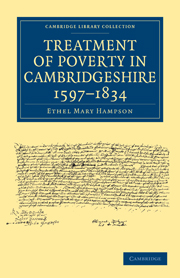Book contents
- Frontmatter
- Contents
- LIST OF ILLUSTRATIONS
- Preface
- EDITOR'S PREFACE
- CHAPTER I INTRODUCTORY: POOR RELIEF IN CAMBRIDGESHIRE BEFORE 1597
- CHAPTER II POOR RELIEF IN CAMBRIDGE DURING THE FIRST PART OF THE SEVENTEENTH CENTURY
- CHAPTER III POOR RELIEF IN WISBECH DURING THE FIRST PART OF THE SEVENTEENTH CENTURY
- CHAPTER IV POOR LAW ADMINISTRATION IN THE RURAL AREAS DURING THE FIRST PART OF THE SEVENTEENTH CENTURY
- CHAPTER V WAGE PROBLEMS. THE PROFITABLE EMPLOYMENT OF THE POOR. FIRST PHASE OF THE MOVEMENT
- CHAPTER VI HOUSING PROBLEMS AND PAUPER LABOUR IN CAMBRIDGESHIRE IN THE EARLY EIGHTEENTH CENTURY. THE ISLE OF ELY AND THE STATUTE OF 1723
- CHAPTER VII THE WORKHOUSE MOVEMENT IN THE TOWNS OF CAMBRIDGE AND ROYSTON, 1723–1785
- CHAPTER VIII THE WORKHOUSE MOVEMENT IN RURAL CAMBRIDGESHIRE, 1723–1785
- CHAPTER IX THE URBAN WORKHOUSES OF CAMBRIDGESHIRE, 1785–1834
- CHAPTER X THE RURAL WORKHOUSES OF CAMBRIDGESHIRE, 1785–1834. PARLIAMENTARY REPORTS OF 1804 AND 1834
- CHAPTER XI SETTLEMENT AND REMOVAL, 1660–1834
- CHAPTER XII PAUPER APPRENTICESHIP
- CHAPTER XIII BASTARDY
- CHAPTER XIV RELIEF OUTSIDE THE WORKHOUSE, 1660–1782
- CHAPTER XV RELIEF OUTSIDE THE WORKHOUSE, 1782–1834
- CHAPTER XVI CONSTITUTIONAL STRUCTURE AND SOCIAL POLICY
- CHAPTER XVII CONCLUSIONS
- APPENDIX
- MS. Sources and Bibliography
- Index of Names
- Index of Places
- Index of Special Subjects
- Plate section
CHAPTER II - POOR RELIEF IN CAMBRIDGE DURING THE FIRST PART OF THE SEVENTEENTH CENTURY
Published online by Cambridge University Press: 07 September 2010
- Frontmatter
- Contents
- LIST OF ILLUSTRATIONS
- Preface
- EDITOR'S PREFACE
- CHAPTER I INTRODUCTORY: POOR RELIEF IN CAMBRIDGESHIRE BEFORE 1597
- CHAPTER II POOR RELIEF IN CAMBRIDGE DURING THE FIRST PART OF THE SEVENTEENTH CENTURY
- CHAPTER III POOR RELIEF IN WISBECH DURING THE FIRST PART OF THE SEVENTEENTH CENTURY
- CHAPTER IV POOR LAW ADMINISTRATION IN THE RURAL AREAS DURING THE FIRST PART OF THE SEVENTEENTH CENTURY
- CHAPTER V WAGE PROBLEMS. THE PROFITABLE EMPLOYMENT OF THE POOR. FIRST PHASE OF THE MOVEMENT
- CHAPTER VI HOUSING PROBLEMS AND PAUPER LABOUR IN CAMBRIDGESHIRE IN THE EARLY EIGHTEENTH CENTURY. THE ISLE OF ELY AND THE STATUTE OF 1723
- CHAPTER VII THE WORKHOUSE MOVEMENT IN THE TOWNS OF CAMBRIDGE AND ROYSTON, 1723–1785
- CHAPTER VIII THE WORKHOUSE MOVEMENT IN RURAL CAMBRIDGESHIRE, 1723–1785
- CHAPTER IX THE URBAN WORKHOUSES OF CAMBRIDGESHIRE, 1785–1834
- CHAPTER X THE RURAL WORKHOUSES OF CAMBRIDGESHIRE, 1785–1834. PARLIAMENTARY REPORTS OF 1804 AND 1834
- CHAPTER XI SETTLEMENT AND REMOVAL, 1660–1834
- CHAPTER XII PAUPER APPRENTICESHIP
- CHAPTER XIII BASTARDY
- CHAPTER XIV RELIEF OUTSIDE THE WORKHOUSE, 1660–1782
- CHAPTER XV RELIEF OUTSIDE THE WORKHOUSE, 1782–1834
- CHAPTER XVI CONSTITUTIONAL STRUCTURE AND SOCIAL POLICY
- CHAPTER XVII CONCLUSIONS
- APPENDIX
- MS. Sources and Bibliography
- Index of Names
- Index of Places
- Index of Special Subjects
- Plate section
Summary
THE STATUTE OF 1597
A new era in the history of poor relief opens with the seventeenth century, or to be more precise, with the closing years of the sixteenth. A comprehensive series of bills dealing with various aspects of poverty passed on to the statute book in 1597–8. Of these the most outstanding was the famous 39 Eliz., c. 3, which, re-enacted in very slightly modified form in 1601, formed the basis of Poor Law administration throughout the whole of the period with which we are concerned. It seems, therefore, desirable to recall the terms of the Act.
In every parish overseers—consisting of the churchwardens together with four substantial householders—were to be nominated yearly under the hand and seal of two or more local justices. Upon these unpaid overseers, or “the greater part of them”, was imposed the duty of providing, with the approval of two justices, for all those “having no means to maintain them”. Power, moreover, was accorded to the overseers to raise the requisite funds by a compulsory rate, leviable “weekly or otherwise” upon “every inhabitant and every occupier of lands in the said parish”, under pain of distraint or if need be of imprisonment.
The poor were distinguished under three heads—the able-bodied, the children, the impotent.
For the relief of the first group there was to be accumulated in each parish the already familiar stock of “flax, hemp, wool, thread, iron, and other necessary ware and stuff”, upon which to set them “on work”.
- Type
- Chapter
- Information
- Treatment of Poverty in Cambridgeshire, 1597–1834 , pp. 13 - 30Publisher: Cambridge University PressPrint publication year: 2009First published in: 1934



